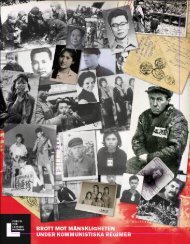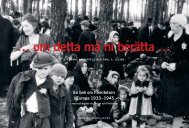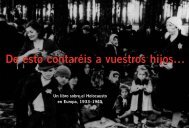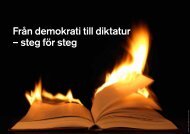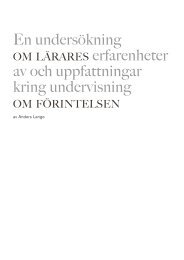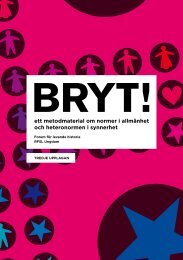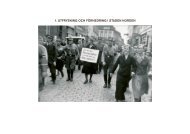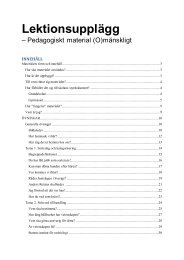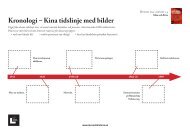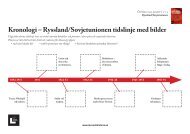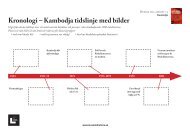Children…
Tell Ye Your Children... - Levandehistoria.se
Tell Ye Your Children... - Levandehistoria.se
- No tags were found...
You also want an ePaper? Increase the reach of your titles
YUMPU automatically turns print PDFs into web optimized ePapers that Google loves.
Witnesses to genocide<br />
From the day Germany occupied Poland, violence,<br />
brutality and cruelty were the rule. The devastation<br />
inflicted on Poland by the Nazis was enormous and its<br />
consequences continue to be felt today. Moreover, the<br />
Poles were forced to witness the Holocaust directly.<br />
Some responded by collaborating with the Nazis, for<br />
instance by denouncing fugitive Jews or turning over<br />
families they had been paid to hide. In contrast, thousands<br />
of Poles put themselves in grave danger trying<br />
to help Jewish friends and neighbours, risking not only<br />
death, but also the lives of their families.<br />
Before the war, Polish-Jewish relations were complicated.<br />
Jews suffered discrimination, and relations<br />
between the groups were often characterised by mutual<br />
mistrust and enmity.Yet during the war even convinced<br />
antisemites sometimes helped Jews. They may have<br />
done so for religious reasons, or because they had been<br />
neighbours. The Polish national resistance organised<br />
a group (Zegota), whose only task was to save Jews.<br />
The struggle against the Nazi enemy sometimes even<br />
enabled the groups to work together. Few still realise<br />
that apart from Jews and “Gypsies”, no group suffered<br />
more at the hands of the Nazis than the Poles.<br />
Many surviving Polish Jews (about 300,000 of some<br />
3 million) returned home, where they were often met<br />
by coldness and outright hostility. Pogroms and individual<br />
attacks caused many to flee again.Today, many Poles<br />
are taking a renewed interest in their nation’s Jewish<br />
past, including abandoned prayer houses and cemeteries.<br />
But the Jews are gone.<br />
I thought of Campo dei Fiori<br />
In Warsaw by the sky-carousel<br />
one clear spring evening<br />
to the strains of a carnival tune.<br />
The bright melody drowned<br />
the salvos from the ghetto wall<br />
and couples were flying<br />
High in the blue sky.<br />
At times wind from the burning<br />
would drift dark kites along<br />
and riders on the carousel<br />
caught petals in mid-air.<br />
That same hot wind<br />
blew open the skirts of the girls<br />
and the crowds were laughing<br />
on the beautiful Warsaw Sunday.<br />
Someone will read a moral<br />
that the people of Rome and Warsaw<br />
haggle, laugh, make love<br />
as they pass by martyrs’ pyres.<br />
Someone else will read<br />
of the passing of things human,<br />
of the oblivion<br />
born before the flames have died.<br />
But that day I thought only<br />
of the loneliness of the dying.<br />
FROM CAMPO DEI FIORI BY CZESLAW MILOSZ,<br />
1943<br />
97



